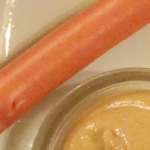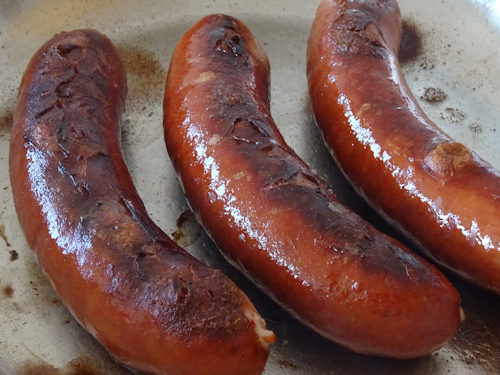
They speak German in Vienna, though this may come as a surprise should you overhear a conversation between two locals. As well as the different pronunciation, “Viennese” has its own vocabulary, too. Including when it comes to sausages.
- The regional dialect has various colourful names for its favourite food
- Some words are likely myths created to entertain German tourists
- No need to learn the names: anyone you meet will likely speak English, too
- See also:
Wienerisch and Wurst

(An Eitrige, otherwise known as a Käsekrainer sausage)
The pronunciation of the Viennese German dialect (called “Wienerisch”) can turn innocent syllables into guttural utterances that bear only a passing resemblance to the equivalent words in standard German (called “Hochdeutsch”).
So while your language teacher says “Gehen wir” (let’s go), your Viennese companion says “Gemma”.
If you learnt German in school or evening classes, you may struggle initially with the local accent. But you do get used to it. Eventually.
Then all you have to do is understand what the words actually mean, because whoever wrote your German dictionary seemingly never went to Vienna.
(Fortunately for visitors practicing their language skills, most locals switch to the more formal version of German with people from out of town. And they speak a lot of English here, should you need it.)
Wienerisch is actually an important window into the culture and history of the city, reflecting the wit, wisdom, and linguistic ingenuity of the Viennese people.
So just as Nordic languages allegedly have numerous words for snow, so it is with Wienerisch and some day-to-day Viennese items: like the humble mainstay of Viennese cuisine, the Wurst (sausage).
You could order a Käsekrainer sausage with a crust of dark bread and mustard in dictionary German. Or you could order an Eitrige (a pus-filled object), with a Bugl (hump) and a G’schissenen (that which is excreted).
Bon Appétit!
Once you get over the unexpectedly imaginative vocabulary, you can see what the Viennese mean.
A Käsekrainer is a popular sausage with bits of cheese inside. When grilled and sliced, the cut surface really does look like something needing antibiotics. And if you’ve ever squeezed mustard out of a tube…
Your sausage might also arrive with Bluat (blood), an Oaschpfeiferl (a rectal whistle) or a Krokodü (crocodile), better known as ketchup, a chilli pepper, and a sliced pickled gherkin.
If you feel like it, ask for a few extra Glasaugen (glass eyes): small pickled onions.
When you’re done, wash it all down with a sechzehner Blech (sixteenth tin): a can of beer. Vienna’s local Ottakringer brewery has its home in the city’s 16th district.
Oh, and if you want your sausage quickly then ask for it tschennifa, a bit of US English integrated into Viennese (tschennifa = Jennifer, from the singer Jennifer Rush).
In the interest of truth and integrity, it’s important to point out that locals and linguists argue about the authenticity of many of these expressions; some may have been invented to amuse visitors.
For example, the national broadcaster (ORF) interviewed the owner of Vienna’s most popular Würstelstand (sausage booth), as chosen by readers of the publication Falstaff in late 2023. He noted that only tourists ever order an Eitrige with a Bugl.
But, as they say in Austria, Das ist ein Streit um des Kaisers Bart (that’s just arguing about the Emperor’s beard).